News Desk
Rawalpindi: (PR) March 30, 2025
An international conference commemorating 1700 years since the First Ecumenical Council of Nicaea was held at the Christian Study Center in Rawalpindi from March 27 to 30, 2025. The event brought together prominent church leaders, theologians, and scholars from Pakistan and abroad, marking a significant milestone for the Christian community in the country.
The conference, convened under the leadership of Rt. Rev. Samuel Robert Azariah, was the first of its kind in Pakistan in terms of scope and global participation. It featured more than 100 delegates representing a wide array of denominations, with at least 10 participants from the international Christian community.
Distinguished global speakers included His Eminence Kurt Cardinal Koch (Roman Catholic), Archbishop Anba Angaelos (Coptic Orthodox), Archbishop Rowan Williams (Anglican), and Rev. Prof. Dr. Charles Amjad-Ali (Church of Pakistan). Each addressed the theological, historical, and contemporary significance of the Council of Nicaea, which was convened in 325 CE to unify the early church and respond to the Arian controversy surrounding the divinity of Christ.
The Council of Nicaea laid the foundation for the Nicene Creed, which remains a core expression of faith for many Christian denominations worldwide. Speakers emphasized its enduring relevance, particularly in the context of modern-day theological discourse and interfaith dialogue in Pakistan.
The event opened with a reception at the Private Hotel in Rawalpindi, attended by a cross-section of society including church leaders, government officials, civil society representatives, and members of the diplomatic community. The gathering highlighted the importance of religious harmony and the role of the Christian Study Center in fostering theological dialogue and social engagement.

Throughout the four-day conference, participants engaged in sessions exploring the legacy of the Nicene Creed and its implications for Christian witness in a Muslim-majority context. Discussions also addressed issues of unity among denominations, the need for theological education, and strategies for inclusive leadership within the church.
Key recommendations from the conference included:
Contextualizing the Nicene Creed to reflect the lived experiences of Christians in Pakistan.
Promoting ecclesial unity at all levels of church leadership and grassroots communities.
Empowering youth, women, and marginalized groups in church leadership roles.
Increasing awareness of Christian creeds and doctrine through education and catechism.
Strengthening interfaith and intra-faith dialogue to promote peace and understanding.
Engaging in respectful theological conversations with Muslims, particularly on the identity of Christ and the doctrine of the Trinity.
Encouraging active expressions of faith through social service and justice-oriented practices.
Including emerging congregational churches in future theological and ecumenical initiatives.
The Christian Study Center was praised for its hospitality and organizational efforts, creating an environment conducive to reflection and learning. Delegates described the event as a landmark occasion for ecumenical cooperation and theological engagement in Pakistan.
In a concluding statement, participants reaffirmed their commitment to building a more inclusive and compassionate Christian presence in Pakistan, rooted in the love and teachings of Jesus Christ. They emphasized the lasting legacy of the Council of Nicaea as a guiding force for faith, unity, and doctrinal clarity in the global and local church.
The conference underscored the growing role of the Christian Study Center as a hub for theological discourse, ecumenical engagement, and interfaith understanding in South Asia.



First off I would like to say fantastic blog! I had a quick
question that I’d like to ask if you do not mind. I was curious to find out
how you center yourself and clear your mind prior to writing.
I have had a hard time clearing my mind in getting my thoughts out.
I do take pleasure in writing but it just seems like the
first 10 to 15 minutes are lost just trying to figure out how to begin. Any suggestions or hints?
Kudos!